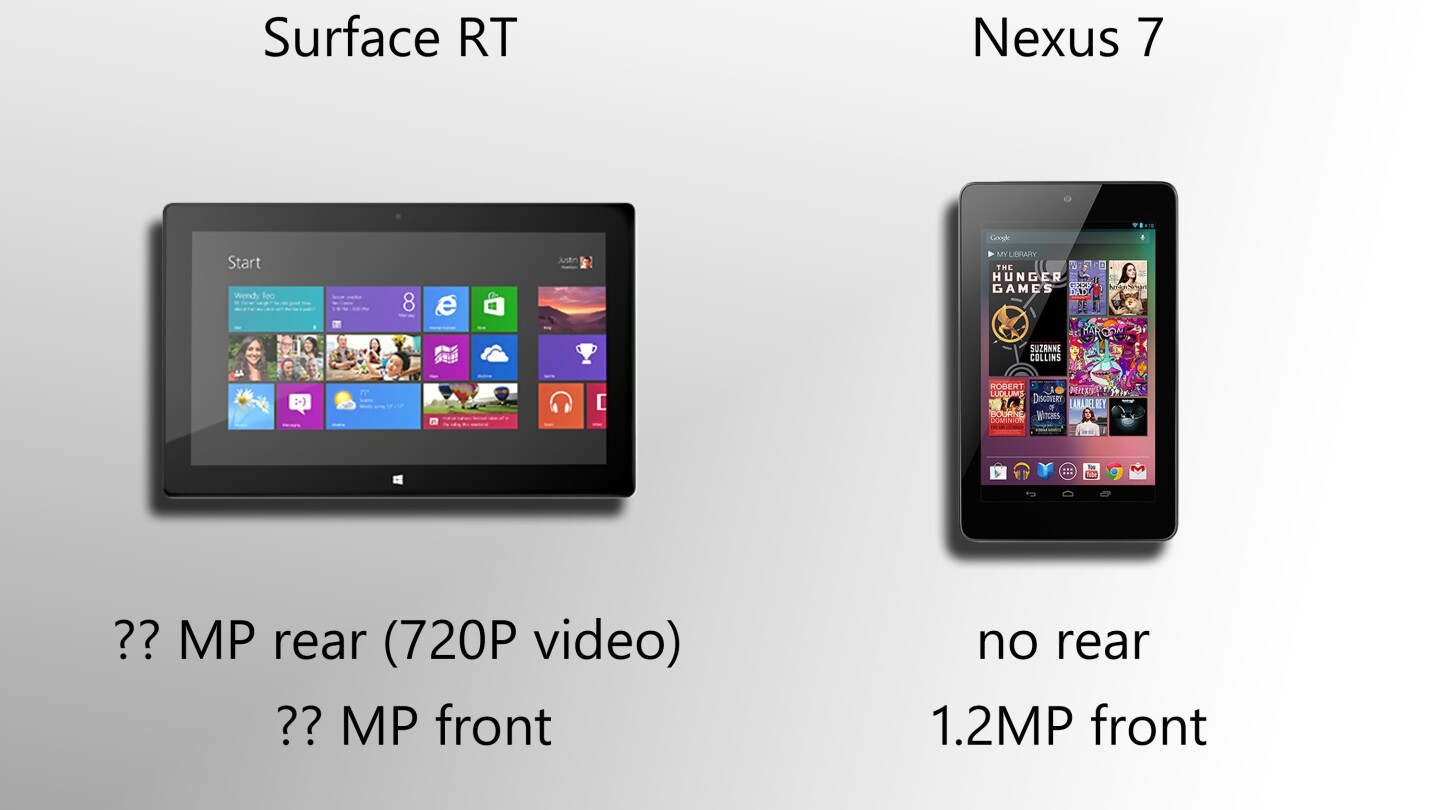The tablet wars have begun. Though the iPad remains in the driver's seat, the last year has shown strong competition from several other companies. Two tablets that will be duking it out for your dollars this holiday season are the Microsoft Surface RT and Google/Asus Nexus 7. Let's see how these two (radically different) tablets compare.
Dimensions

Nobody is going to get these two confused. Surface is a full-sized tablet, while Nexus 7 is a mini-tablet. Microsoft's slate is intended for landscape mode, while Asus' is primarily a portrait device.
Despite its much larger build (or maybe because of it?), Surface is a bit thinner than the Nexus 7.
Weight

Surface is exactly twice as heavy as the Nexus 7. This lends itself to Microsoft's more productivity-focused brand, while the Nexus 7 is more in line with the Kindle Fire. They're both great for casual one-handed reading, browsing, and gaming.
Display

Microsoft insists that its ClearType display boosts the "perceived resolution" in Surface, but until we get our hands on one, we're skeptical. For a 2012 tablet, Surface's resolution is sub-par. It barely has more pixels than the Nexus 7, despite toting an extra 3.6 (diagonal) inches.
Processor

The tablets' chips are almost identical. Both rock NVIDIA Tegra 3 SoCs; the only difference is that Surface sports the (slightly higher clocked) T30 model, while the Nexus has the T30L.
RAM

This could potentially give Surface the edge in performance, as its 2GB of RAM double the 1GB in Nexus 7.
Storage

These numbers could be changing soon. Leaks have shown a 32GB Nexus 7 model coming for the holidays at the same price point as the present 16GB model. As it stands now, though, Surface offers more storage.
Wireless

Neither device (at present) offers mobile data. You'll need a Wi-Fi network to connect to both tablets.
Cameras

Microsoft hasn't revealed the full specifications for Surface's cameras, but it does have two "720p HD" shooters. The Nexus 7 only sports a front-facing camera.
Battery

Surface's battery hardware is superior, but it's also powering a larger display. The Nexus 7 gets terrific battery life, though, and Microsoft would be fortunate to see similar uptimes.
Intangibles

As physically different as the two devices are, they may differ even more in software. Surface runs the new Windows RT branch of Windows 8, while the Nexus 7 runs Android 4.1, Jellybean. Since Windows RT doesn't run traditional Windows desktop software, the Nexus 7 has a big advantage in terms of apps. Microsoft has worked with developers to make sure Windows Store doesn't launch as a ghost town, but it has some catching up to do.
The Touch Cover keyboard is Surface's killer feature. As an optional add-on (an extra US$100 bundled, or $120 separately), it can quickly transform the tablet into something resembling a laptop. The accessory features unique pressure-sensitive keys, and it can fold over to protect the display (similar to Apple's Smart Covers). The tablet's built-in kickstand and bundled Microsoft Office only accentuate its work-oriented brand.
... then there's the matter of price. The 32GB Surface (without keyboard) costs US$500, while the 8GB Nexus 7 is a mere $200. For the price of one Surface, you could buy two Nexus tablets and still pocket $100. Apple sells $500 iPads in bunches, but it's the established market-leader; Microsoft is walking on shaky ground with its unproven Surface.
Summing up
Surface and Nexus 7 are two different devices, with different strengths and weaknesses. Microsoft is angling for a new kind of device with Surface: a tablet that takes a bit more from laptops, and a bit less from smartphones. Whether that works for you is your call, but remember that few outside of Microsoft have even touched one. Until the device gets in customers' hands, much is still a mystery.
The Nexus 7 is already established as one of the best 7-inch tablets on the market. The iPad Mini, however, is looming on the horizon. Unless you're fervently pro-Android or anti-Apple, it couldn't hurt to wait for the event before plunking down for a new Nexus 7.
What do you think: was Microsoft smart to go straight for the high end of the tablet market, or would it have been wise to start with something more affordable? Let us know in the comments.














